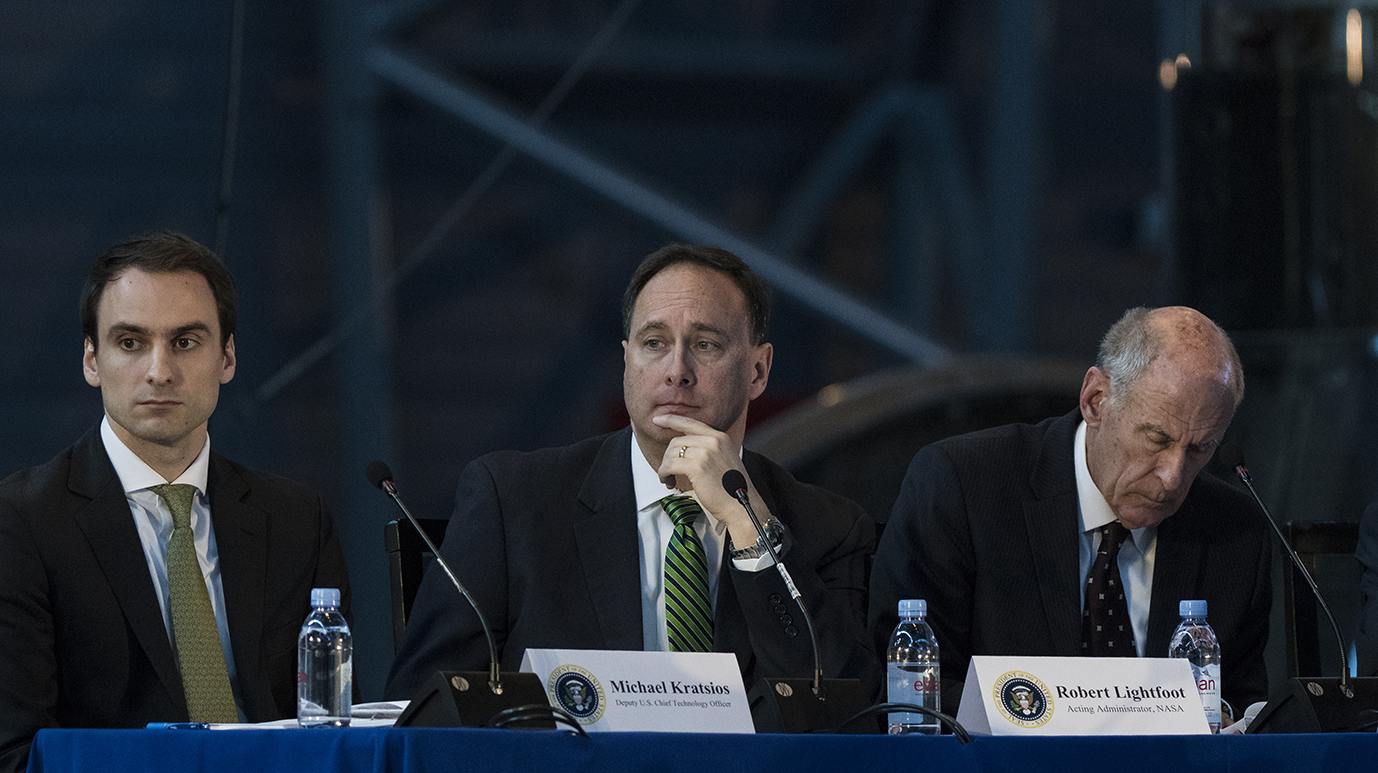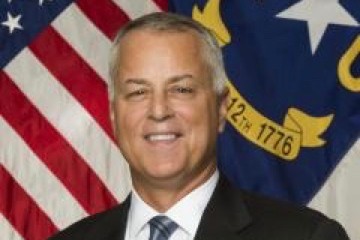
The White House is taking advantage of a loophole to install loyalists to President Donald Trump in acting senior roles at the Pentagon, effectively skirting the Senate confirmation process.
While the number of vacancies isn’t new — one-third of the Defense Department’s 60 Senate-confirmed positions are filled on a temporary basis — the White House in recent months has been sending over people to fill open spots, as opposed to the more traditional method of tapping people within the Pentagon.
The White House on Monday announced that it was assigning Michael Kratsios, a 33-year-old White House chief technology officer, as the head of research and engineering for the entire DoD. Kratsios, who has a bachelor’s degree in political science, is replacing Michael Griffin, a former NASA administrator with a Ph.D. in aerospace engineering.
The administration has also discussed installing Anthony Tata, the controversial Fox News regular who has been nominated to be the Pentagon’s top policy official, in a different senior DoD role on an acting basis, according to an official familiar with the discussions. The move would head off what is expected to be a bruising confirmation hearing focused on now-deleted Islamophobic tweets.

Experts and Democratic lawmakers alike decried the campaign to root out those seen as disloyal and replace them with Trump acolytes, some of whom are underqualified. They worry that a climate that values loyalty over expertise scares away the best prospects and injects politics into an organization that tries to operate above partisanship.
Lindsay Cohn, an associate professor at the Naval War College specializing in civil-military relations, who spoke in a personal capacity, expressed concern that "the criterion that seems to be getting these particular young, inexperienced people in is personal loyalty to the president."
“This can actually undermine the entire idea of a meritocratic democracy because it creates power with connection with the patron as opposed to power within the structure of the system," she said.
“This administration is shamefully circumventing the Senate confirmation process to install partisan puppets in senior Pentagon posts," said Sen. Richard Blumenthal (D-Conn.). "By exploiting loopholes, they seek to escape congressional and public scrutiny of these underqualified officials. This is a threat to our national security and I will keep fighting to ensure rigorous oversight of executive branch appointees.”
The White House declined to comment.
Under the Vacancies Act, a person who is not Senate-confirmed cannot serve as an acting undersecretary or higher. But the act allows the president to grant exceptions in three cases: someone confirmed to a position at a different agency; the “first assistant”; and someone who has been employed by the agency for at least 90 days and paid at least at a GS-15 rate.
Kratsios, who previously served as an aide to venture capitalist Peter Thiel, was named as the Pentagon’s technology chief under the first exception. Kratsios will keep his White House job while wearing the Pentagon hat, a balancing act that critics say will make it impossible to do the Pentagon job well.
“You can’t be dual-hatted and work at the Pentagon,” said Jim Townsend, who served as the deputy assistant secretary of defense for Europe and NATO policy from 2009 to 2017. “This is also that pattern Trump has had of putting actings in there. They are in there only for a year, they are beholden to him, they will do what he says.”
"The real problem is the Trump Administration simply can’t attract top tier talent for these critical posts," added Chip Unruh, spokesperson for ranking Senate Armed Services Democrat Jack Reed of Rhode Island. "The President prioritizes blind fealty to him above competence and it shows."

Some national security experts have defended Kratsios’ record on technology issues, from AI to 5G, however. He was unanimously confirmed by the Senate as White House CTO.
“Michael has been instrumental in advancing AI for the United States, but has been equally effective in developing and implementing a strategy to ensure the United States and its allies and partners maintain distinct economic and security advantages in all other emerging and disruptive technologies,” Lt. Gen. Jack Shanahan, director of the Defense Department’s Joint AI Center, told one outlet July 13. “I could not think of anyone better to step in behind Dr. Mike Griffin.”
The Senate Armed Services Committee has yet to schedule a confirmation hearing for Tata, the nominee for the Pentagon’s top policy job. If his confirmation stalls, the president would have the option of using the third exception under the Vacancies Act to name him as "acting" in a position that has been recently vacated, the official with knowledge said. Tata, who is expected to face a tough confirmation hearing due to Islamophobic tweets unearthed by CNN, is serving in a Senior Executive Service position, formally designated as a “senior adviser,” according to DoD spokesperson Charles Prichard. He “performs tasks as directed by Secretary of Defense [Mark] Esper,” Prichard said.
Foreign Policy first reported in May that Tata was being asked to sit in on meetings as a senior adviser to Esper. Several Democratic members of the Senate Armed Services Committee oppose his nomination.
Sen. Jim Inhofe, an Oklahoma Republican and chair of the Senate Armed Services Committee, defended the administration’s recent personnel moves, arguing that the White House is using the Vacancies Act "for its intended purposes."
“I still think it’s important to have as many Senate-confirmed officials in Pentagon leadership roles as possible, and the Armed Services Committee will continue to hold up its responsibilities to make sure that’s the case," Inhofe said. "This is not taking advantage of loopholes — but simply making sure our federal government is functional at all times, and I haven’t seen President Trump or his Administration abusing this process.”
A Senate Armed Services Committee aide noted that the law would prohibit Tata from both serving as acting undersecretary of defense for policy and concurrently being the nominee.
Other Democratic lawmakers condemned Tata’s nomination.
"The Defense Department is responsible for the security of Americans and the civilians charged with leading the Department must be well-qualified. Donald Trump and Mark Esper must not cram in unqualified and ill-suited nominees, especially Islamophobic conspiracy theorists like Anthony Tata," said Sen. Elizabeth Warren (D-Mass.).
The policy shop that Tata would lead has experienced a high level of churn in recent months. John Rood, who was confirmed as undersecretary of defense for policy in 2018, was forced out by the White House in February over his management style and involvement in approving military aid to Ukraine. While the White House pushes lawmakers to confirm Tata despite their reservations about his background, James Anderson, who is confirmed as the deputy for policy, is serving in the top position in an acting capacity.
In addition, Daniel Green, who’s been performing the duties of the deputy for policy, recently returned to his role handling strategy and force development, Prichard said. Victorino Mercado, who handles strategy, plans and capabilities, is now filling in for Green.
The White House has also installed loyalists at the deputy level, and frequently shuffles them around wherever they are needed. For example, Michael Cutrone, formerly Vice President Mike Pence’s top South Asia official, arrived at the Pentagon in May to focus on security cooperation (and is still listed as such on DoD’s website), but is now working on international security affairs, according to Prichard. This is not a Senate-confirmed job, but the No. 1 position, the assistant secretary of defense for international security affairs, has not been filled permanently since October 2018.
Cutrone slid into the principal deputy position after the White House essentially forced out his predecessor, Katie Wheelbarger, for insufficient loyalty to the president.
It is not unusual at the end of a presidential term for the administration to install younger officials to replace those who are turning over to season them for future roles, Townsend said. The difference here is that the people are being installed to report back to the White House on what’s being said in the hallways, he said.
“These aren’t the bright-eyed, bushy tailed young master’s degree students who worked in the campaign and are now being sent over to get some experience,” Townsend said. “They are not coming over to learn; they are coming over also to be the White House forward — the forward operating base.”
In another example, Ezra Cohen-Watnick, an aide to former national security adviser Michael Flynn who has been serving as senior director of intelligence programs on the National Security Council staff, was recently to a role handling counternarcotics and global threats. However, he is also working on special operations/low intensity conflict, Prichard said.
Trump has said he will nominate Lou Bremer, a controversial former Navy SEAL, for the No. 1 job of assistant secretary of defense for special operations/low intensity conflict. In the meantime, Christopher Miller, who most recently served as the special assistant to the president and senior director for counterterrorism and transnational threats on the National Security Council, is performing the duties of that role.
And Tom Williams, who recently completed a temporary assignment as the acting senior director for European and Russian Affairs on the National Security Council staff at the White House, has now returned to his position working on strategies, plans and capabilities.
What is abnormal about the situation is how long many of these people have been in acting roles, and how many people have been shuffled around to different positions, Cohn said.
“It’s totally normal for a president to want his people to be loyal, but the way that most presidents do this is they pick people at the top of the organizations [and] let those people pick the people who work with them and below them,” Cohn said. “This administration has blocked a number of lower level appointments that their secretaries wanted because of loyalty … it’s fairly unusual.”
The moves come as White House personnel conduct interviews with the department’s political appointees for jobs in a second Trump term, including high-level undersecretaries such as Ellen Lord, the Pentagon’s chief weapons buyer, according to a defense official and two former defense officials.
Pentagon spokesperson Jonathan Hoffman noted that the interviews with the White House Presidential Personnel Office were set up by DoD "so that our political appointees could discuss second term opportunities at the Department and throughout the administration."
The backgrounds and level of experience of Pentagon leaders is a growing area of concern for defense policy veterans who worry that as the challenges facing the military grow, there is too little focus on developing the seasoned leadership team that can work together to tackle them.
A report issued this week by the Center for a New American Security, which was co-authored by Michele Flournoy, the undersecretary of defense for policy in the Obama administration, said the Pentagon needs leaders with a record of “deep expertise and competence in their areas of responsibility; proven leadership in empowering teams, listening to diverse views, making tough decisions, and delivering results.” And they must be “able to work well in a team of strong peers.”
In an interview, Flournoy insisted that the report “wasn’t a critique of this administration specifically” but said she sees a lack of appreciation for how important it is to appoint senior Pentagon officials who “have the personalities and collegiality to work together effectively.”
“A lot of government projects founder on the shoals of personality conflicts among peers,” she said. "The urgency of this and the risks of failure are too great to overlook that dimension of the problem. And so that’s why we called it out. You can spend way too much time fighting turf wars and personality power struggles instead of getting the mission done.”
Connor O’Brien and Bryan Bender contributed to this report.
Source: politico.com
See more here: news365.stream






